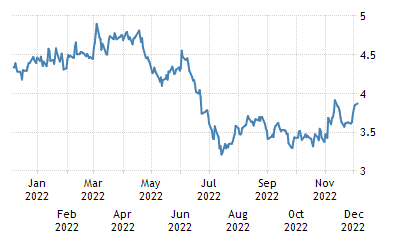
A spread is a term used to describe a trade that involves buying one security and simultaneously selling another. Spread trades involve buying and selling security. Futures contracts and options are commonly used to execute spread trades, but other securities are available as well. Here is a description of each type. Before you trade with spreads, it is important to understand what they are.
Spread Intramarket
Intramarket spreads can be used by traders to spread their positions between different months of the same commodity. Often called calendar spreads, they are defined as holding a long position in one contract month and a short position in another. There are some differences between calendar spreads and intramarket spreads in options trading, and it's important to understand both. Intramarket spreads are an important tool for traders looking to gain a competitive edge in the marketplace.

A trader can trade intramarket spreads for as low as $338, even though an outright position requires a minimum margin of $2,000 This allows for smaller accounts to gain access to the exact same products without having excessive margin requirements. In addition, intramarket spreads tend to trend more dramatically than outright futures contracts. This means that traders can benefit from the market's momentum by taking positions in a short futures contract, gaining exposure to the market, and making a profit from the market's swings.
Bid-ask spread
The bid-ask spread measures the difference in price between the ask and bid prices. It is a key indicator of market liquidity and transaction costs. High liquidity indicates a high number order to buy or to sell. This allows prices and market values to be traded more closely. In other words, as market liquidity decreases, the bid-ask spread becomes tighter and more pronounced.
This difference in prices is the cost incurred by market makers to supply quotes. Transaction costs for traders who account the bid/ask spread will be lower if they do so. They will also be able to profit from the market's turn if they can accurately predict volatility and trade accordingly. John Wiley & Sons, a publisher a trading manual on derivatives, argues traders who account for the bid-ask spread are better able to predict market volatility.
Fixed spread
The better choice when comparing fixed spreads to varible spreads is the one that's more flexible. Variable spreads might be more appealing for traders who are willing or able to take on higher risk. However, the difference between them eventually will even out. Fixed spreads are more suitable for traders with smaller or less frequent trading volumes. Also, scalpers may find fixed spread brokers more suitable than variable spreads. You should know that a wide fixed spread is not the best fit for beginner traders.

Besides lowering the cost of trading, fixed spreads also offer predictability and security. Although floating spreads are advertised by brokers as being tight, they may not be as tight as they claim. It is crucial to know your fixed spread well in advance. It is important to understand how much trading costs in volatile markets. If you have never traded in a foreign currency before, it may be a good idea to check if your broker offers a fixed spread.
FAQ
What is the distinction between marketable and not-marketable securities
The principal differences are that nonmarketable securities have lower liquidity, lower trading volume, and higher transaction cost. Marketable securities, on the other hand, are traded on exchanges and therefore have greater liquidity and trading volume. You also get better price discovery since they trade all the time. There are exceptions to this rule. For example, some mutual funds are only open to institutional investors and therefore do not trade on public markets.
Non-marketable securities tend to be riskier than marketable ones. They are generally lower yielding and require higher initial capital deposits. Marketable securities are typically safer and easier to handle than nonmarketable ones.
A large corporation bond has a greater chance of being paid back than a smaller bond. This is because the former may have a strong balance sheet, while the latter might not.
Investment companies prefer to hold marketable securities because they can earn higher portfolio returns.
How are securities traded?
The stock market is an exchange where investors buy shares of companies for money. Shares are issued by companies to raise capital and sold to investors. These shares are then sold to investors to make a profit on the company's assets.
Supply and Demand determine the price at which stocks trade in open market. The price rises if there is less demand than buyers. If there are more buyers than seller, the prices fall.
There are two methods to trade stocks.
-
Directly from the company
-
Through a broker
Why are marketable securities Important?
An investment company's primary purpose is to earn income from investments. It does so by investing its assets across a variety of financial instruments including stocks, bonds, and securities. These securities are attractive to investors because of their unique characteristics. They are considered safe because they are backed 100% by the issuer's faith and credit, they pay dividends or interest, offer growth potential, or they have tax advantages.
Marketability is the most important characteristic of any security. This refers primarily to whether the security can be traded on a stock exchange. You cannot buy and sell securities that aren't marketable freely. Instead, you must have them purchased through a broker who charges a commission.
Marketable securities include corporate bonds and government bonds, preferred stocks and common stocks, convertible debts, unit trusts and real estate investment trusts. Money market funds and exchange-traded money are also available.
These securities are often invested by investment companies because they have higher profits than investing in more risky securities, such as shares (equities).
Why is a stock called security?
Security is an investment instrument, whose value is dependent upon another company. It could be issued by a corporation, government, or other entity (e.g. prefer stocks). If the underlying asset loses its value, the issuer may promise to pay dividends to shareholders or repay creditors' debt obligations.
Can bonds be traded
The answer is yes, they are! You can trade bonds on exchanges like shares. They have been for many years now.
The main difference between them is that you cannot buy a bond directly from an issuer. They can only be bought through a broker.
It is much easier to buy bonds because there are no intermediaries. This means that you will have to find someone who is willing to buy your bond.
There are many different types of bonds. While some bonds pay interest at regular intervals, others do not.
Some pay interest every quarter, while some pay it annually. These differences make it easy for bonds to be compared.
Bonds can be very helpful when you are looking to invest your money. Savings accounts earn 0.75 percent interest each year, for example. If you were to invest the same amount in a 10-year Government Bond, you would get 12.5% interest every year.
You could get a higher return if you invested all these investments in a portfolio.
What is the difference between a broker and a financial advisor?
Brokers are specialists in the sale and purchase of stocks and other securities for individuals and companies. They take care of all the paperwork involved in the transaction.
Financial advisors are experts on personal finances. They can help clients plan for retirement, prepare to handle emergencies, and set financial goals.
Financial advisors can be employed by banks, financial companies, and other institutions. They may also work as independent professionals for a fee.
If you want to start a career in the financial services industry, you should consider taking classes in finance, accounting, and marketing. Also, you'll need to learn about different types of investments.
Statistics
- Even if you find talent for trading stocks, allocating more than 10% of your portfolio to an individual stock can expose your savings to too much volatility. (nerdwallet.com)
- The S&P 500 has grown about 10.5% per year since its establishment in the 1920s. (investopedia.com)
- Ratchet down that 10% if you don't yet have a healthy emergency fund and 10% to 15% of your income funneled into a retirement savings account. (nerdwallet.com)
- Individuals with very limited financial experience are either terrified by horror stories of average investors losing 50% of their portfolio value or are beguiled by "hot tips" that bear the promise of huge rewards but seldom pay off. (investopedia.com)
External Links
How To
How can I invest in bonds?
You will need to purchase a bond investment fund. They pay you back at regular intervals, despite the low interest rates. These interest rates are low, but you can make money with them over time.
There are several ways to invest in bonds:
-
Directly purchase individual bonds
-
Buy shares of a bond funds
-
Investing through an investment bank or broker
-
Investing through a financial institution.
-
Investing via a pension plan
-
Directly invest with a stockbroker
-
Investing via a mutual fund
-
Investing via a unit trust
-
Investing using a life assurance policy
-
Private equity funds are a great way to invest.
-
Investing with an index-linked mutual fund
-
Investing via a hedge fund